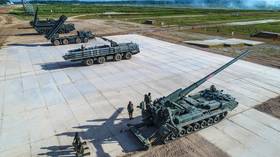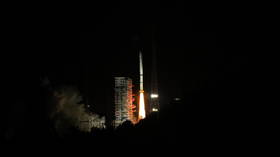If the West keeps sidelining Russia, it could create a giant North Korea and land in big trouble
Artyom Lukin
Artyom Lukin is an associate professor of international relations at Far Eastern Federal University in Vladivostok, Russia. Follow him on Twitter @ArtyomLukin
3 Aug, 2020 17:40

America’s pivot to China as its main adversary means Russia gets relegated to the role of a secondary bogeyman. But while Russia lags behind China’s economic prowess, its ambitions and military mean it won’t let itself be ignored.
Iranian Supreme Leader Ayatollah Khameini famously branded the United States the “Great Satan,” while calling the Soviet Union the “Lesser Satan.” Today, Washington may be nearing its own “Great Satan versus Lesser Satan” moment. As America’s confrontation with China grows ever uglier, the US political class is forced to reconsider the prioritization of strategic threats.
The current documents guiding US national security, such as the National Security Strategy and National Defense Strategy, identify both China and Russia, labeled“revisionist powers,” as the principal externalthreats to America. However, there are growing calls from within theUS security establishment to commit more resources to dealing with the China challenge while putting Russia somewhat on the backburner. See, for example, a policy paper released last week by the influential Center for a New American Security. The paper makes recommendations for the next edition of the National Defense Strategy. Its authors call for the US Department of Defense to have more clarity about who exactly is America’s main adversary. While both China and Russia “are indeed revisionist and pose considerable risk to US interests, the magnitude of the challenge posed by a China with the world’s second-largest economy far exceeds that of Russia.”
The paper further argues that, “for the sake of bringing greater clarity to the application of the department’s time, energy, and budget resources, NDS 2022 should go further than its predecessor by being explicit that China is the principal priority, while Russia is the focus of the secondary effort. This will have the immediate effect of ending a debate within various parts of the Pentagon, where some factions give priority to the European theater and others to the Pacific.”
The logic of Russia being a lesser threat looks obvious given the apparent long-term trends of Russia’s economic and technological decline versus China’s unstoppable rise. It seems the right thing to do for the US to concentrate on the fire-breathing, awe-inspiring Chinese dragon and pay much less attention to the scrawny, emaciated Russian bear.
With the bear, the task seems relatively easy: you just need to hold Russia at bay through a combination of military deterrence and economic sanctions. But such logic may turn out to be seriously flawed. What if the bear refuses to quietly languish in her lair? Washington’s decision to downgrade the Russian threat will hardly be appreciated in Moscow. Rather, it could push Moscow to take a more aggressive posture. Why? Because Moscow will continue to demand attention from the West to secure the recognition of its major-power status and satisfaction of its basic security and economic interests. And the Kremlin can be infinitely creative in devising ways to make life, well, interesting for the NATO countries. If it resolves to do so, Russia – even in the state of decline – can hold Europe, and possibly parts of the Middle East, at constant risk, keeping them on constant alert and forcing the US to maintain substantial military commitments to the European and Middle Eastern theaters.
Another encouragement for Russia to act more aggressively could come from its main “strategic partner” – China. Russia could be of great value to Beijing by keeping big chunks of US resources tied down in Europe. Russia will not do China’s bidding for free. Beijing will have to reward Russia for acting as a major spoiler against the US. The reward could come as direct payouts from Chinese coffers and/or other forms of economic aid. As a wild suggestion, could we, for example, see Russian mercenaries on China’s payroll stirring trouble in the places in the Middle East where the US and its allies have vital stakes?
Looking into the future, a very real scenario is “North-Koreanization” of Russia, whereby Russia remains a major challenge to the West despite, or perhaps because of, the economic degradation and isolation. North Korea, with the economy less than one-50th of the size of the South’s, continues to present a major military threat to South Korea, Japan and, having now acquired intercontinental ballistic missiles, even to the US.
Russia, even after its predicted decline, will definitely be vastly more powerful than North Korea. Similar to Pyongyang, which uses its nukes and provocations to extort money and status recognition, a threatening military posture would be the only way for Moscow to get what it wants from the West. The geo-economic dependence on China will be another commonality between Russia and North Korea.
ALSO ON RT.COMBanning TikTok gives Trump cheap anti-China points but undermines his free speech chops in war with Twitter and Google
Pyongyang acts as a strategic buffer for China in Northeast Asia. It is also a serious distraction for the US in the Asia-Pacific, precluding the Pentagon from wholly concentrating on the Chinese PLA. This is one reason Beijing backs the Kim dynasty, providing it with an economic lifeline. Russia is well positioned to perform a similar role for China and, of course, it has the potential to play spoiler on a much bigger scale.
Summing up, Washington’s likely de-prioritization of Russia as a strategic threat will do little to actually diminish the Russian challenge. Moscow is not going to quietly fade away from the scene. It could even push Russia to act more boldly and aggressively, most probably in close coordination with China.
The only way for the US to avoid the above scenario would be to find accommodation with Russia, including the lifting of sanctions and recognition of Moscow’s red lines in Europe. It seems a heavy price to pay, especially given the inevitable hysterics that would come from Poland, the Baltics and a few other Europeans. The current mood in Washington is that the US is capable of dealing both with the dragon and the bear. Thus no hard tradeoffs between the Pacific and Europe seem necessary. This may be true, for now. But, as China continues to amass power, Washington may be forced to reconsider. Just wait.
The statements, views and opinions expressed in this column are solely those of the author and do not necessarily represent those of RT.


0 Comments:
Post a Comment
Subscribe to Post Comments [Atom]
<< Home